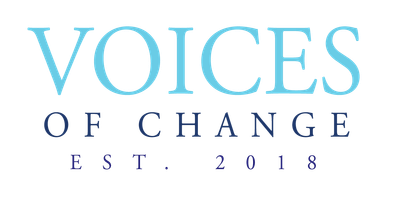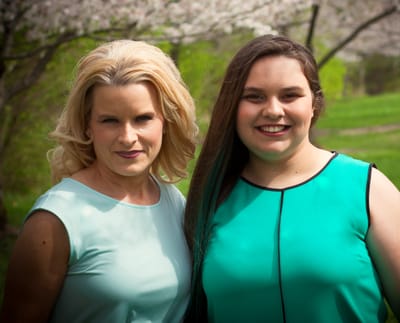The History

Nicole Moehring and her daughter Maci founded voices of Change 2018 ("VOC18"). The passion and drive behind starting this organization came after Maci and her brother Evan, who was diagnosed with Fragile X Syndrome, Autism, and two heart conditions, were both unfortunate victims of sexual abuse and assault.
VOC18 is different from other organizations like Autism Speaks, The Upside of Downs, or United Cerebral Palsy because it is not focused on a specific disability. Instead, it helps people with cognitive, intellectual, and physical disabilities, regardless of their race, religion, ethnicity, or gender identity. The organization also helps the families and guardians of these individuals.
Nicole never realized how vulnerable her son was to abuse because no one talks about the statistics, and there is very little preventive education for individuals with disabilities. Nicole believes that with proper education, she and her family would be better prepared and able to help her son.
Nicole believed that her son's disability made him lose his rights. He faced discrimination from those who were supposed to protect him, and his voice was NEVER heard. She felt alone in her search for justice and resources to help her son recover, as well as support their family.
Individuals with disabilities who have been victims of abuse/assault need a voice, advocates, and preventive education, along with education on the next steps, access to support systems and recovery.
VOC18 is different from other organizations like Autism Speaks, The Upside of Downs, or United Cerebral Palsy because it is not focused on a specific disability. Instead, it helps people with cognitive, intellectual, and physical disabilities, regardless of their race, religion, ethnicity, or gender identity. The organization also helps the families and guardians of these individuals.
Nicole never realized how vulnerable her son was to abuse because no one talks about the statistics, and there is very little preventive education for individuals with disabilities. Nicole believes that with proper education, she and her family would be better prepared and able to help her son.
Nicole believed that her son's disability made him lose his rights. He faced discrimination from those who were supposed to protect him, and his voice was NEVER heard. She felt alone in her search for justice and resources to help her son recover, as well as support their family.
Individuals with disabilities who have been victims of abuse/assault need a voice, advocates, and preventive education, along with education on the next steps, access to support systems and recovery.
The vision, THE MISSION
THE VISION
Voices of Change 2018 is establishing a strong network by working closely with educators, county boards of developmental disabilities, mental health and medical professionals, law enforcement, and other related organizations.
This initiative aims to champion the rights of individuals with cognitive, intellectual, and developmental disabilities by promoting awareness, providing education, and offering essential resources.
THE MISSION
To minimize the risk of abuse, neglect, and exploitation of individuals with cognitive, developmental, and intellectual disabilities.
Voices of Change 2018 is establishing a strong network by working closely with educators, county boards of developmental disabilities, mental health and medical professionals, law enforcement, and other related organizations.
This initiative aims to champion the rights of individuals with cognitive, intellectual, and developmental disabilities by promoting awareness, providing education, and offering essential resources.
THE MISSION
To minimize the risk of abuse, neglect, and exploitation of individuals with cognitive, developmental, and intellectual disabilities.
Statistics
In the United States, there are approximately 74,234,075children under 18. Of those, 4.3% or 3,192,062 have a disability. According to The US Children’s Bureau estimates, 678,000, or 21.2% of children, were determined to be victims of abuse or neglect in 2018.
Worldwide, there are 1.3 billion children under the age of 18. Assuming the same rate as the United States, there are 55.9 million children under the age of 18 with disabilities. Therefore, worldwide, there are 11,850,000 children with disabilities being abused.
It is suspected that the rate of child abuse and neglect is at least three (3) times higher in children with disabilities than in their typically developing peers.
However, due to underreporting, it’s challenging to know the actual numbers of how many individuals with disabilities have been victims of abuse or neglect.
The Centers for Disease Control (CDC) reports that 91% of the time, children are abused by someone known and trusted by the child or the child’s family members.
If your child, step-child, grandchild, niece, nephew, or child you knew was disabled and you found out he/she was abused, would you sit back and be able to stay silent or allow the abuse to continue?
This is a global systemic health epidemic, one that needs to be addressed NOW!
Worldwide, there are 1.3 billion children under the age of 18. Assuming the same rate as the United States, there are 55.9 million children under the age of 18 with disabilities. Therefore, worldwide, there are 11,850,000 children with disabilities being abused.
It is suspected that the rate of child abuse and neglect is at least three (3) times higher in children with disabilities than in their typically developing peers.
However, due to underreporting, it’s challenging to know the actual numbers of how many individuals with disabilities have been victims of abuse or neglect.
The Centers for Disease Control (CDC) reports that 91% of the time, children are abused by someone known and trusted by the child or the child’s family members.
If your child, step-child, grandchild, niece, nephew, or child you knew was disabled and you found out he/she was abused, would you sit back and be able to stay silent or allow the abuse to continue?
This is a global systemic health epidemic, one that needs to be addressed NOW!
Why are Individuals with disabilities more vulnerable to being abused?
Individuals with disabilities can place higher emotional, economic, physical, and social demands on their families. Which often leads to multiple caregivers caring for them. The individual may have contact with numerous people, increasing the opportunity for abuse. The presence of various caregivers can either increase or decrease the risk of abuse of individuals with disabilities. However, advantages to having a large number of caregivers are that more individuals may detect the injuries or signs of abuse, and the additional assistance may decrease the amount of stress placed on the primary caregivers. Risk may be minimized by careful screening and selection of caregivers, sporadic and unscheduled monitoring of care, and recognizing that any child may become a victim of child abuse and neglect.
Individuals with Disabilities are particularly vulnerable to being abused due to:
Individuals with Disabilities are particularly vulnerable to being abused due to:
- Conditioned compliance due to the need for interventions
- Frequent separation from typical peers
- Increased exposure to multiple adults and caregivers
- Lack of education in body awareness and boundaries
- Limited verbal communication and vocabulary
- Many people have a preconceived notion that individuals with disabilities are asexual or nonsexual
- Parents of children with disabilities often feel so anxious when it comes to their children growing up and having relationships
- Reliance on helpers for personal and physical needs
- Societal expectations that children with disabilities are extremely friendly to all people, even strangers
- Strong desire for attention = vulnerability to manipulation
Why we need to Start having tough conversations
Many families live in denial, as our founder, Nicole, did, thinking, “It will never happen to my child because he/she has a disability.” Because of a lack of education, parents do not know how to talk to their children about body safety, secrets vs. surprises, good touches vs. bad touches, boundaries, caring adults, etc. As parents, we provide the foundation for body safety and healthy relationships, tailoring the conversations to our child’s cognition level. It can not be a one-and-done conversation. Conversations need to happen on an ongoing basis.
Even with education and increased awareness, abuse of individuals with disabilities is still extremely difficult to talk about. As a society, we need to be able to speak openly about abuse to end the stigma, reduce the risk, and protect our innocent loved ones.
We no longer live in a world where silence is an option for any systemic issue.
It's our responsibility to protect our children and loved ones. Change needs to start at home.
Even with education and increased awareness, abuse of individuals with disabilities is still extremely difficult to talk about. As a society, we need to be able to speak openly about abuse to end the stigma, reduce the risk, and protect our innocent loved ones.
We no longer live in a world where silence is an option for any systemic issue.
It's our responsibility to protect our children and loved ones. Change needs to start at home.
A Message From THE Founders

Our family went through this. We should have had access to support and services, but we didn’t. We should have been supported, but we weren't. We felt the devastation and never want anyone else to feel that way.
We have built a foundation from our lived experience by providing:
1. Preventative education for individuals with disabilities, their parents, guardians, medical and mental health professionals, and law enforcement
2. Guidance, resources, and support for victims and their families
Nicole Moehring, Founder Maci Moehring, Co-founder